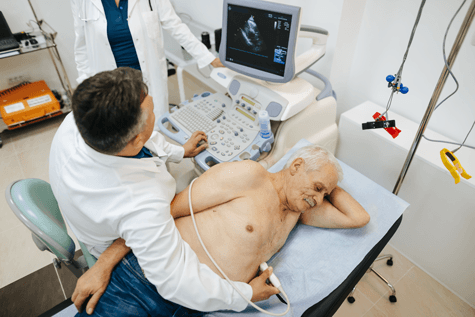Tests and scans
The ultrasound scanner has a probe that gives off sound waves. The probe looks a bit like a microphone. The sound waves bounce off the heart and the probe picks them up. The probe links to a computer that turns the sound waves into a picture on the screen.
You also have sticky pads with wires connected to your chest. These track your heart rate during the test.
The test takes between 20 minutes to 1 hour. You usually have an echo in the hospital x-ray or heart department. A specially trained heart ultrasound specialist (echocardiographer) does the test.
People who are having cancer treatment might have an echo because:
you’re due to have or are having a cancer treatment that might affect the heart
you have a known heart condition
you have had a heart trace (ECG) and the doctor needs more information about your heart
the doctor or nurse has examined you and listened to your heart and they need more information
You might have an echo at different times during your treatment. This is to check how well your heart is working and for possible changes to your heart function.
You don’t need to do anything before you have the test. Take your medicines as normal and you can eat and drink as usual.
The person doing the test will explain the procedure to you before they start. You can ask any questions you might have about your test.
You undress from the waist up and you can put on a hospital gown.
You might have the echo in a darkened room. This is so the person scanning can see the heart pictures more clearly.
You usually lie on your left side on a couch next to a machine with a TV screen. Do let the person doing the scan know if you are uncomfortable. They will do all they can to try to make you more comfortable.
You will usually have a few small sticky pads put on your chest. Wires are then attached to the pads, which are connected to the echo machine. This monitors your heart rate and rhythm.
The person doing the scan covers the ultrasound probe in gel, which helps the probe slide easily. The gel can sometimes feel cold on your skin. They move the probe over your chest around the area of the heart. This allows them to get a good view of the heart from different angles. To get clear pictures, they may ask you to change your position during the echo.

During the test you’ll hear your heartbeat and a swishing noise from the echo machine. The swishing noise is your blood flow.
They’ll take pictures and measurements during the test. This information is then sent back to your doctor.
After your echo
When the test is finished you wipe off the gel left on your skin. You can get dressed and go back to the ward, home or back to work.
An echo is a safe test. There are no risks from this test.
You should get your results within 1 or 2 weeks or maybe sooner. This depends on how quickly your doctor needs the results.
Ask your doctor or nurse how long it will take to get them. Contact them if you haven’t heard anything after a couple of weeks.
You might have contact details for a specialist nurse who you can speak to for information if you need to. It can help to talk to a close friend or relative about how you feel.
We have more information on tests, treatment and support if you have been diagnosed with cancer.
Last reviewed: 31 Mar 2025
Next review due: 31 Mar 2028
Find out about tests to diagnose cancer and monitor it during and after treatment, including what each test can show, how you have it and how to prepare.
Find out about possible causes of cancer, how cancer starts and grows, tests to diagnose it, and general information about treatments.
Search for the cancer type you want to find out about. Each section has detailed information about symptoms, diagnosis, treatment, research and coping with cancer.

About Cancer generously supported by Dangoor Education since 2010. Learn more about Dangoor Education
Search our clinical trials database for all cancer trials and studies recruiting in the UK.
Connect with other people affected by cancer and share your experiences.
Questions about cancer? Call freephone 0808 800 40 40 from 9 to 5 - Monday to Friday. Alternatively, you can email us.